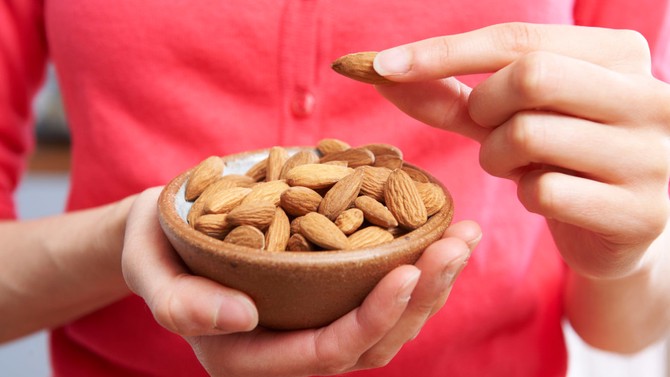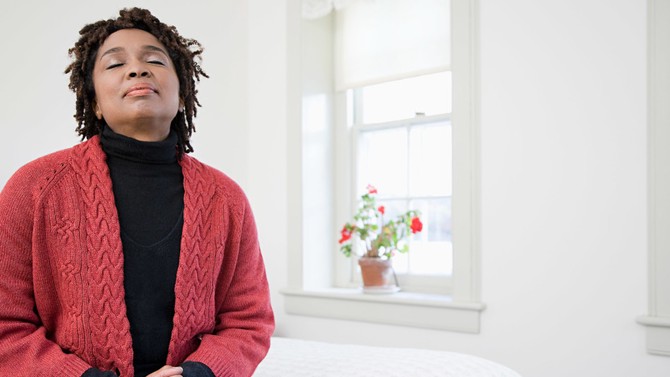9 Daily Rituals to Help You Cope with Stress
If you're looking to calm down stat, we've got quick calming techniques you can turn to anytime, anywhere.

Photo: Photodjo/iStock
Find that sweet spot
This "occipital rub" was designed to be DIY, says Denise Galon, a certified massage therapist in New York. Place your first three fingers behind your head at the spots just behind the ears where the neck connects to the head. With your elbows bent, push your fingers toward and away from one another, creating a rubbing movement on the base of the skull. Do this for 30 seconds, or until you feel yourself loosening up. — Corrie Pikul

Photo: MachineHeadz/iStock
Grab a handful of nuts
Those little bags of mixed nuts can do more than tame your craving for something salty. Cashews, almonds and walnuts are excellent sources of magnesium, which experts say can help our wired bodies take things down a notch. Studies show that most Americans don't get enough magnesium, and it's particularly deficient in people with anxiety. — Corrie Pikul

Photo: AleksandarNakic/iStock
Cue up your favorite song
No, it doesn't have to be classical music. Listening to songs of their choice helped patients who were about to undergo surgery feel less anxious, according to a study in the Journal of Advanced Nursing. If you need some inspiration, here are eight songs that can help you feel calmer. — Emma Haak

Photo: Eva-Katalin/iStock
Pop in a stick of gum
That pack of gum you carry around in case of a yellowtail-and-scallion emergency can freshen your mood as well as your breath. Researchers from Australia and England found that when agitated people chewed gum, they felt less anxious, more alert and had 18 percent less cortisol (the stress hormone) in their saliva. The study authors hypothesize that chewing increases blood flow to the brain, which helps with alertness and may also distract us from irritants. — Corrie Pikul

Photo: XiXinXing/istock
Flex your muscles
"Start by clenching the muscles in your forehead and face as you take a breath and hold it for a moment," says Nina Smiley, PhD, coauthor of The Three Minute Meditator. "As you release the tension, exhale fully and relax. Work your way down your body, repeating the process. The tightening and releasing is a physical cue to the body to let stress go." — Kim Tranell

Photo: Aksakalko/istock
Pour yourself a cuppa tea
Drinking four cups of black tea a day for six weeks helped people de-stress faster and lower their cortisol levels after a stressful event, according to a study from University College London. (Black tea is high in antioxidants, which may lead to relaxation by affecting neurotransmitters in your brain.) You could also try valerian root tea for an immediate calming effect. "Tea made from valerian root relaxes the nerves," says Roberta Lee, MD, the vice chair of the Department of Integrative Medicine at Beth Israel Medical Center and the author of The SuperStress Solution. "Think of it as a very weak Valium." — Emma Haak

Photo: GCShutter/istock
Take a smoke break (without the smoking)
"In a way, smokers have the right idea," says Julian Ford, PhD, professor of psychiatry at the University of Connecticut School of Medicine and coauthor of Hijacked by Your Brain. "When they step outside to light up, they're doing one of the most important—and hardest—parts of de-stressing: taking a break. They consciously distance themselves from immediate pressures and remove themselves from all the cues that say, Work harder. This naturally turns down the alarm in their brain. Happily, you don't have to engage in dangerous behavior like smoking to do this. Simply walking away from stressors for a few minutes can be one of the best practices for learning to handle daily pressure." — Kim Tranell

Photo: imtmphoto/istock
Count your breaths
"By forcing yourself to breathe as you do in your most relaxed moments, you trick your body into releasing calming neurohormones, causing a biological shift in how you feel," says psychotherapist Belleruth Naparstek, a leader in the field of guided imagery. "Just inhale and feel your abdomen expand. Go as slowly as possible, counting in—1-2-3. Then, observe the turn of your breath, and breathe it out—1-2-3. Whether you do this for one minute or five, it's going to bring you to a calmer place." — Kim Tranell

Photo: PeopleImages/istock
Meditate
This one's so simple yet so effective. An analysis of 39 studies on mindfulness-based therapy found that meditation can treat anxiety, mood disorders and depression. Better yet, a study published in the Proceedings of the National Academy of Sciences found that meditation can lower stress levels in less than one week. Try starting with these five one-minute meditations, and for even more motivation to practice, here are six additional ways meditation benefits your body and brain. — Emma Haak
Published 03/29/2017

